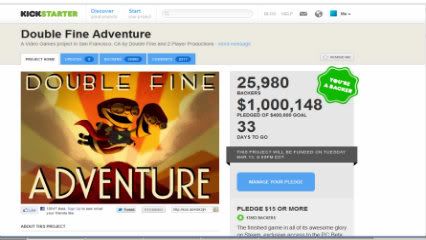
There is a growing concern at the back of my mind about gamers being so readily willing to throw their money away at any old project that tugs at nostalgic memories, entices with promises of grandeur, or even perhaps genuinely has strong pedigree behind it.
A Kickstarter fund was made famous by Tim Schafer, a well known game developer who asked for $400,000 in order to make an in-house adventure game without the outside influence of nasty publishers (who, by all accounts, are all equally satanic). The fund reached over a million within 24 hours and peaked around 2.5 million. In the month of February 2012 just over $9,000,000 was donated to Kickstarter funds in total.

Perhaps it is human nature to think that money can create or solve anything; after all we’ve been using the same way of thinking to buy our way into a cure for cancer for years now, but I can’t help but see problems arising that everyone else seems oblivious to. Let’s give Tim Schafer a lot of money and see what he can do, after all he’s made some great games! He’s made some bad ones too – but let’s not focus on that.
It should be pointed out that should a Kickstarter fund fail to reach the target set at creation no money will be taken, and so this mitigates a form of risk on behalf of those offering up their money; but this is a fallacy in the grand scheme. The risk – the gamble – is not that what you have chosen to donate to may not meet its minimum amount, rather that it might hit it and you contribute to a dangerous trend that will demonise innocent parties, take years to see a ‘return’ on, and potentially leave you ultimately unsatisfied.
What follows is a look at some of the motivations behind the creators and donors of Kickstarter programs and my personal opinion on them. This by no means accounts for all Kickstarters or the people who choose to support them, but will most likely be a growing trend in what this form of creation will become as exposure continues.

“I miss so-and-so, a game from my childhood.”
And so someone with a tenuous link to the original game held so high upon a pedestal in your memories wants to make one exactly like it for smartphones and only needs a moderately small amount of cash to make it a reality. You can’t hit donate fast enough. I used to work in a book store, so I want to write a book.
“I’ll get access to early stages of the game!”
And play test it. An optimist might see community spirit but the realist will see free labour. In fact worse than free, since you’ve paid to work. Yes, this model worked for Minecraft and while innovative it certainly wasn’t unique in its scope. It was a game that was developed over a long period of alphas and betas, but there were other factors which led to the success of this approach. At its most basic level without all the bells and whistles Minecraft is a creation game – meaning as long as you had imagination and enough blocks you could make what you liked. If you were given a tub full of Lego blocks without the box they originally came in you could still do something with them. If you were given a car accessory set without a car, what could you do with it? Actually, a doctor friend of mine had an answer for that so ignore that analogy (and pardon the pun).
“I like the stupid videos they make on YouTube so they’ll make a good indie game!”
Sorry, but this one is only in here because I am baffled that people donated over a quarter of a million dollars to the Yogcast game Yogventures set in the Yogverse full of the Yognaughts. If it had an odour it would be arrogance and the base ingredient would be Minecraft diluted in enough sewage to hide and spoil the scent. Let’s not even get started on the fact they could fund their own indie game if they wanted.
“This way only the people who need the money to create the game will get it.”
Though only a small point, this is not entirely true. As a (voluntarily) leaked summary of a successful Kickstarter fund revealed, a fairly substantial proportion of the money gathered went to things other than components directly involved in creating the promised game. The biggest being various legal necessities and paperwork along with a proportion going to the Kickstarter site itself.
“This way a publisher won’t force the developer to make stupid changes.”
Is there not a fundamental flaw in both the assumption that publishers want to ruin the games they plan to publish, but also that any input they might offer (be it forced or simply suggested) would be any less useful than that gained by pitching a fund which promises to listen to the input of people who donated and who play the game as it gets created? A camel is a horse created by a committee regardless of who the committee is made up of.
A different worry is in the rights of those who have donated to a fund which hit or exceeded their target and then stalls in development for whatever reason. If a projected release date is not met – what then? If the head of the project were to tragically die what would happen? Money spent can’t be unspent.

I don’t wish to tarnish all gaming related Kickstarters as a bad idea (though truth be told I have not seen one I have even contemplated donating to) nor do I want to paint a picture of a world full of perfect publishers immune to mistakes or stupid decisions since that would be nonsensical; but I am not happy with how Kickstarters are seen as the answer to a question that didn’t need to be asked. Funding projects through this method is the in thing and a fad which may or may not quietly disappear in the future, but damage done now will not fade away as fast.
A year or two or three from now when the results of Kickstarter funds begin to appear I can’t help but think that there will be many people disappointed. Not only that but publishers may suffer, and we will suffer as a result – even if the accusations levied at them are true in some cases. It is a lose-lose situation we have volunteered our way into with naïve bliss and open wallets which started with one man just wanting to make a game in a different way. It is not Tim Schafer’s fault for having this goal – it’s ours and everyone else’s who now sees this as the way to create something for the gaming world, which is mistakenly thought of as being better by some unquantifiable degree when compared to the alternative. Kickstarters are not a cure for gaming cancer. They are just another form of it.
















Comments